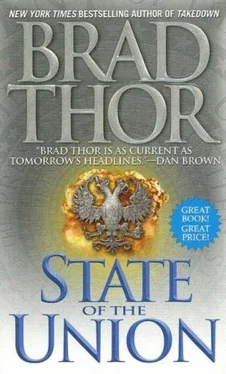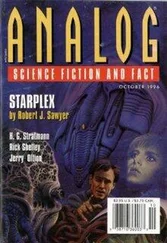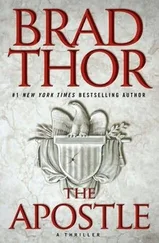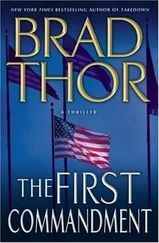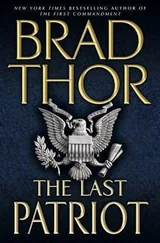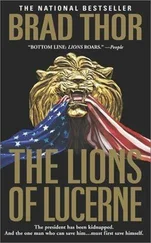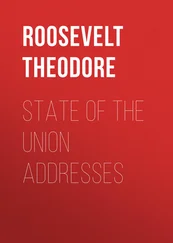The transmitter connected, they sat down with a piece of paper and tried to figure out the encryption code Gary would have established with Frank Leighton, while Harvath continued to glance at his watch.
After seeing the stein in the Putzkammers’ livingroom, Scot had become convinced that the code somehow involved the serial numbers on the bottom of the team mugs.
“So what was Leighton’s number then?” asked DeWolfe.
“He was somewhere in the middle. Five or six, I think,” replied Harvath, trying to remember back to the stein he had seen in the laundry room that doubled for Leighton’s home office back in Maryland. “No, wait. It was seven.”
“Are you sure?”
“Yes, I’m sure,” replied Harvath.
“That’s still only three digits-the seven and the twelve.”
“Not if you put a zero in front of it,” said Herman who was looking through some of the boxes of memorabilia that Gerda Putzkammer had stored in her office. “That would be the correct way to do it.”
“So it would read 07 of 12?” asked Harvath.
DeWolfe wrote it down and said, “That would work, but what about the rest of it?”
“I’ve been thinking about that too,” said Harvath. “Gary was a Patton fan. Actually he was more like a Patton freak.”
“As in General Patton?” asked DeWolfe.
“Yeah, he had studied the guy up and down. He knew all of his moves, and just like Gary, Patton didn’t care for the Soviets one single bit. In fact, at the end of World War II, Patton wanted permission to go after them. He said if the U.S. would give him ten days, he’d start a war with them that would make it look like their fault and the U.S. could be justified in pushing them all the way back to Moscow.”
DeWolfe, concerned with their dwindling timeframe, said, “So Gary liked Patton. Patton hated the Communists and wanted to get rid of them. Being army guys, Gary’s men probably also liked Patton. That is a legitimate connection. Now, what can we take numbers wise from him? It has to be something relatively easy to remember.”
“I’ve been thinking about that,” said Harvath. “Patton commanded the Third Army in World War II, and they spent 281 days fighting in Europe.”
“Possible,” said DeWolfe with a certain degree of skepticism as he wrote it down.
“He invented the 1913 Patton sword.”
DeWolfe continued writing. “Okay.”
“Don’t forget the M-46 and M-47 Patton Tanks,” said Herman, picking up another catalog.
“I think we’re really reaching on these,” replied DeWolfe.
“I can also give you his birth date, death date, and the date he was buried.”
“That’s a bit better. All right, we’ll give these a try, but if we can’t crack it, you’ll have to wing it with Leighton. The mere fact that you located the proper emergency contact point should win you some credibility with him.”
Harvath nodded his head in response, but knew that if he couldn’t fulfill the full terms of the emergency contact plan, Leighton wasn’t going to listen to a thing he had to say.
DeWolfe powered up the burst transmitter and waited as it cycled through the welcome screen and then dropped him into the calendar program. “Okay. We’re in the calendar function. As I said before, the key here is to tap into the correct date. What do we want to try first?”
“Birth date,” said Harvath. “November 11th 1885.”
“The scheduler doesn’t go back that many years. Let’s just focus on the actual month and day,” replied DeWolfe as he found November 11th and went to the appointment scheduler.
“Anything?” replied Harvath.
“Nope. Just a regular page.”
“No prompts for a security code when you try to make an appointment?”
“No. Let’s try another date.”
They tried the date Patton died, the date of his burial and even the date of his car accident without any luck.
“How much time do we have left?” asked DeWolfe.
Harvath checked his tactical chronograph. “Less than fifteen minutes.”
“What do you want to do?”
“Try July 22nd.”
“What’s that correspond to?” asked DeWolfe as he scrolled to the date.
“Patton’s capture of Palermo.”
Harvath could tell by the look on DeWolfe’s face that the date wasn’t a winner. “Try August 16th. The capture of Messina.”
“Nothing,” said DeWolfe.
“Shit. May 8th. Victory Day in Europe.”
“Still nothing.”
“Well,” said Harvath, “does anyone have any other suggestions?”
Herman cleared his throat on the other side of the office and asked, “Did you ever see the moviePatton with George C. Scott?”
“Sure,” replied Harvath, glancing again at his watch, “I don’t know a single red-blooded American military person who hasn’t, but what does that have to do with what we’re trying-” Suddenly, he had an idea. Turning to DeWolfe, he said, “Try June 5th.”
“What’s June 5th?”
“The opening scene in the movie is the speech Patton gave the Third Army before the D-Day invasion. I should have thought of that earlier. It’s probably the greatest speech Patton ever gave.”
“You’re welcome,” said Herman who went back to reading his catalog.
“Bingo,” exclaimed DeWolfe. “The scheduler is asking us to enter a code. What now?”
“Let’s start running through some of the numbers we came up with. Try Leighton’s stein number and subtract the amount of days the third army was in Europe, plus today’s date.”
Harvath waited until DeWolfe looked up from the transmitter and said, “Negative.”
“Okay, Leighton’s number minus the 1913 sword classification, plus today’s date.”
Once again, DeWolfe responded, “Negative.”
“Patton’s sidearm was a.45-caliber Colt Peacemaker. How about substituting 45 for 1913?”
DeWolfe ran the equation, but still came up empty. “Zip,” he said.
“Damn it,” replied Harvath, his frustration mounting as the minutes ticked away. “I know Patton believed in reincarnation and really identified with Hannibal, the Carthaginian general. Hannibal began his march on Rome in 218. Try that.”
“Scot, you’re reaching way far here.”
“Do you have a better idea?”
“No, but-”
DeWolfe was interrupted by a snort from Herman.
“What’s so funny?” snapped Harvath. “You got a problem with Hannibal?”
“I wasn’t laughing about Hannibal,” replied Herman.
“What were you laughing at then?”
“Never mind.”
“No. What is it? I want to know.”
“In the beginning of The King George, Gerda Putzkammer apparently offered her customers printedmenus, just like in a restaurant. And no matter what it was, every price ended in sixty-ninepfennings. Very kitsch.”
Harvath was just about to tell Herman he wasn’t helping, when he got that ping in his head again and this time it shook something loose. “Take 68 and subtract Leighton’s 0712, plus today’s date,” he said to DeWolfe.
“But what’s 68?” asked the communications expert.
“Just do it.
Harvath was sitting literally on the edge of his seat until DeWolfe looked up with a smile and turning the transmitter toward him said, “We’re in.”
“We are?” said Herman, setting down his the materials he was looking at and walking over to the desk. “Where the hell did the number68 come from?”
“Don’t ask me,” said DeWolfe. “Ask Harvath. He finally figured out the code.”
With his eyes glued on the burst transmitter, Scot replied, “When we were driving back to the hospital, DeWolfe and I were talking about how burst codes needed to be easy to remember. That made me think about Patton and how he said that when he wanted his men to remember something and really make it stick, he used eloquent profanity. Sometimes, so did Gary. You just reminded me of an old joke of his that I hadn’t thought about in a long time.What’s a 68? It’s like a 69, except you do me and I owe you one.”
Читать дальше
